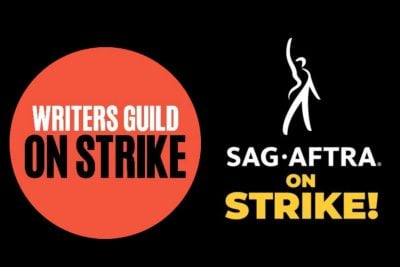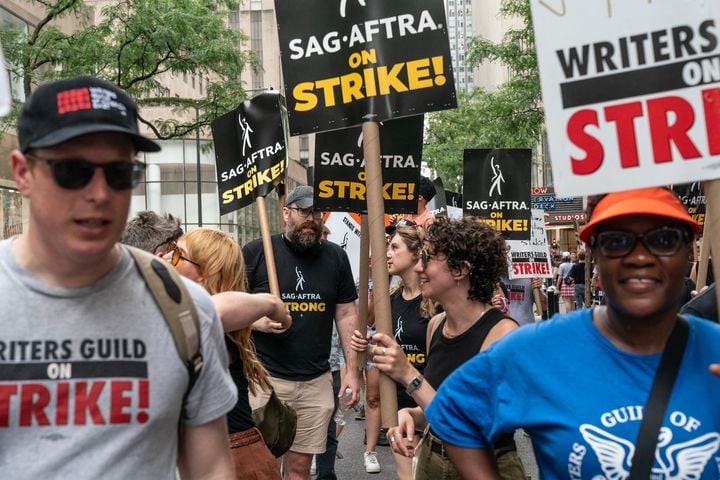Screen Actors on Strike: SAG-AFTRA Releases Entire Text of Tentative Agreement Pending Ratification
Joining the WGA in July, both unions have ended their work stoppages while debate continues over the terms of the contracts

All Global Research articles can be read in 51 languages by activating the Translate Website button below the author’s name.
To receive Global Research’s Daily Newsletter (selected articles), click here.
Click the share button above to email/forward this article to your friends and colleagues. Follow us on Instagram and Twitter and subscribe to our Telegram Channel. Feel free to repost and share widely Global Research articles.
***
On November 24, the Screen Actors Guild-American Federation of Television and Radio Artists (SAG-AFTRA) national board leadership made public the full text of a tentative contract agreement.
The union had been on strike for 118 days, since July 14, one of the longest such actions in many decades.
Preceding SAG-AFTRA, the Writers Guild of America (WGA), had walked out on May 2 when extended negotiations failed to prevent a strike against the Alliance of Motion Picture and Television Producers (AMPTP). The joint labor action involved more than 171,000 union members impacting the economy and social life of millions throughout the United States.
WGA ended its strike on September 27 and opened the ratification process on October 2. Just one week later, October 9, the tentative agreement was approved overwhelmingly.
Nonetheless, they could not fully return to work with approximately 160,000 screen actors and other artists still on strike. The WGA and SAG-AFTRA joined hundreds of thousands of other organized workers in the United States during 2023 who either threatened to strike or did withhold their labor due to unacceptable conditions of employment.
Meridith Stiehm, the President West of the WGA, issued a statement saying:
“Through solidarity and determination, we have ratified a contract with meaningful gains and protections for writers in every sector of our combined membership. Together we were able to accomplish what many said was impossible only six months ago.”
Debate Over the Terms of the Proposed Contract
Even prior to the release of the entire 128-page document which constituted the tentative agreement between SAG-AFTRA and the AMPTP, disagreements had surfaced over key elements of the dispute between the union members and the studios. On top of the list is the use of Artificial Intelligence (AI) by the owners in the process of generating, producing and distributing of television and film content. WGA and SAF-AFTRA viewed the unrestricted utilization of AI as a means to further the exploitation of writers, actors and announcers, potentially replacing the need for thousands of jobs which previously went to union members.
In addition, there is the major issue of fair compensation from streaming services which were accused of not being forthright in reporting their statistics for the number of viewers. Under previous contracts, residuals were paid for reruns aired over the years.
WGA and SAG-AFTRA picketers (Source: Abayomi Azikiwe)
Today with numerous streaming platforms such as Netflix, Hulu, Disney+, among others, the WGA in their negotiations, demanded a new system of calculating residuals. However, it appears that the public sharing of data related to viewership will not be implemented. The data available from the corporations will only be available for six people to peruse. Even if union members demand an audit of the figures, the examiners will be required to sign a confidentiality agreement. See this.
As it relates to the tentative agreement involving SAG-AFTRA and AMPTP there are two major differences which have surfaced within the leadership. The president and chief negotiator of SAG-AFTRA, Fran Drescher and Duncan Crabtree-Ireland respectively, have encouraged the membership to accept the agreement saying it provides substantial gains over conditions which were prevailing prior to the strike.
Crabtree-Ireland wrote in a cover letter sent out to members for the ratification process:
“These contracts achieve more than $1 billion in NEW compensation and benefit plan funding (including an additional $317.2 million to the benefit plans). The contracts establish lengthy and detailed AI guardrails that didn’t exist before and do protect you as we meet the challenge of this new technology, hair and makeup equity, significantly increased background coverage, outsized streaming residuals, a new streaming success fund, and so much more. These gains are only possible because of your sacrifice, solidarity and tenacity over the 118 days of the strike and are assured if you vote to ratify the agreement.”
If approved, the Memorandum of Agreement will extend from November 9, the day after the negotiating team and national board accepted the offer of the owners, until June 30, 2026. Union members have up until December 5 to cast their votes.
Other voices have also been heard which do not approve of the proposed contract. Award-winning actor Matthew Modine, a national board member of SAG-AFTRA, publicly announced through an open letter that he would not be voting in favor of the contract.
“Happy holiday season. There’s so much to be grateful for. The Screen Actors Guild-American Federation of Radio and Television Artists (SAG-AFTRA) can be thankful that the prolonged strike is over. We appreciate the negotiation committee and their attempt to arrive at a fair and equitable deal. While there are improvements and gains, I will not vote to ratify the contract. Members should vote their conscience. I cannot endorse a contract that compromises the independence and financial futures of the performers. As a National Board Member, it’s morally mandatory to stand beside and provide protection for fellow members. Especially those beginning their careers, those unable to defend themselves, and in this case, their identities, their voices, and their physicality, from being taken away by a technology that no one fully understands. It demands a warning to members that says do not consent to the terms of employment defined by the terms within this contract. Consenting to these terms is a pre-negotiation that will take control of the financial and creative future of every working member of SAG-AFTRA. Consent is surrender.”
Modine argues that the federal government does not have a clear policy regulating the use of AI. Therefore, under these circumstances there needs to be definitive guidelines for people working in the entertainment industry.
Economic Impact of the WGA and SAG-AFTRA Strikes
With more than 171,000 writers and actors on strike between May and November, mainly in the state of California, there were huge financial losses. Although some analysts suggested that the lack of production for films and television saved cash for the studios, this cannot be viewed in light of the potential profits from ticket revenues and advertising which did not materialize.
When 171,000 people are not reporting to work other sectors of the economy will also lose jobs and profits. The timing of the strikes came as many businesses were attempting to recover from the downturn which occurred during the height of the pandemic in 2020-2021.
The Hollywood Reporter emphasized in the aftermath of the November 8 announcement that SAG-AFTRA had reached a tentative agreement:
“The strikes put more than 100,000 actors and writers out of work, but all the other workers that were sidelined may be even more consequential in what turned out to be a labor standoff costing billions. The list includes directors, editors, grips, makeup artists, props suppliers and location managers, among dozens of other professions that make a production go round.”
Moreover, the end of the strikes by WGA and SAG-AFTRA does not mean that production will immediately resume. Shifts in scheduling for television programs and films will mean that there will be far less episodes and movies over the next several months until the summer of 2024.
What the WGA and SAG-AFTRA strike confirmed was that the working class in the U.S. is ready to take industrial action in response to the burgeoning economic crises of the last two decades. The Great Recession of 2007-2009 wiped out millions of jobs while creating the conditions for huge concessions on the part of organized and unorganized labor.
Tens of millions of working families have lost their homes and rental units since the Great Recession and the later pandemic, illustrating the lack of guarantees for the masses regarding the necessities of modern life within capitalist society. Although military spending continues to skyrocket along with megaprofits for multi-national corporations and financial institutions, the proletariat and nationally oppressed are expected by the ruling class to accept austerity and even deeper impoverishment.
The militancy of the trade union movement must find a political expression where the working class and the oppressed can speak in their own names putting forward demands based solely upon their own interests. This imperative will become even more obvious in light of the 2024 national elections where both the Democratic and Republican parties will inevitably fail to address the important problems which can resolve the social aspirations of the majority of people in the U.S.
*
Note to readers: Please click the share button above. Follow us on Instagram and Twitter and subscribe to our Telegram Channel. Feel free to repost and share widely Global Research articles.
Abayomi Azikiwe is the editor of the Pan-African News Wire. He is a regular contributor to Global Research.
Featured image is from Abayomi Azikiwe


